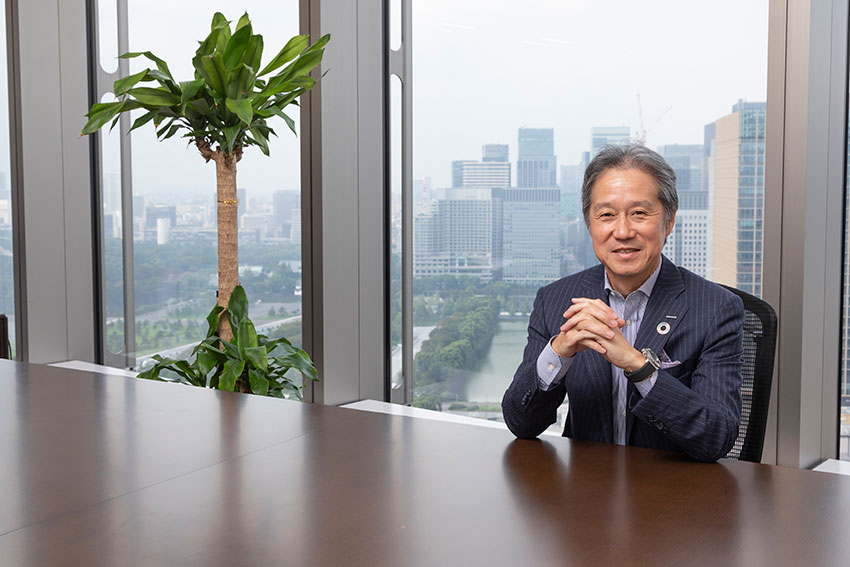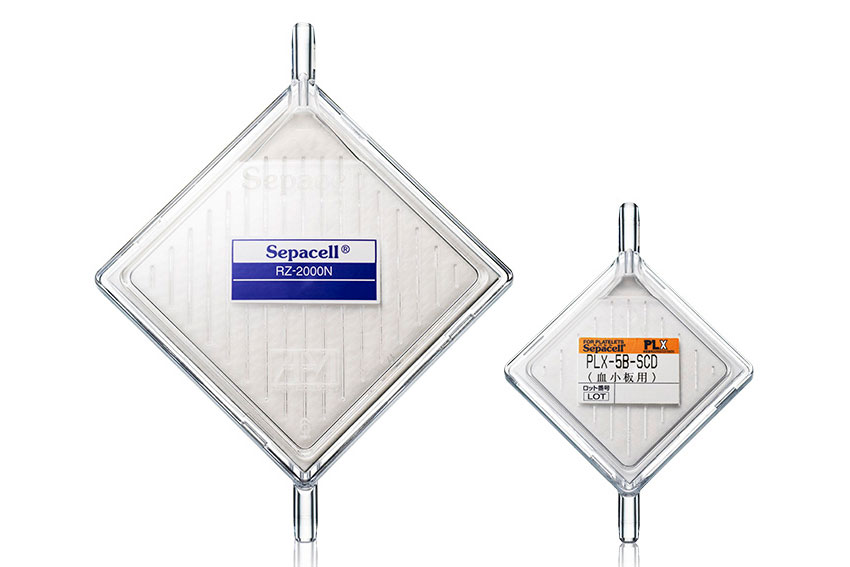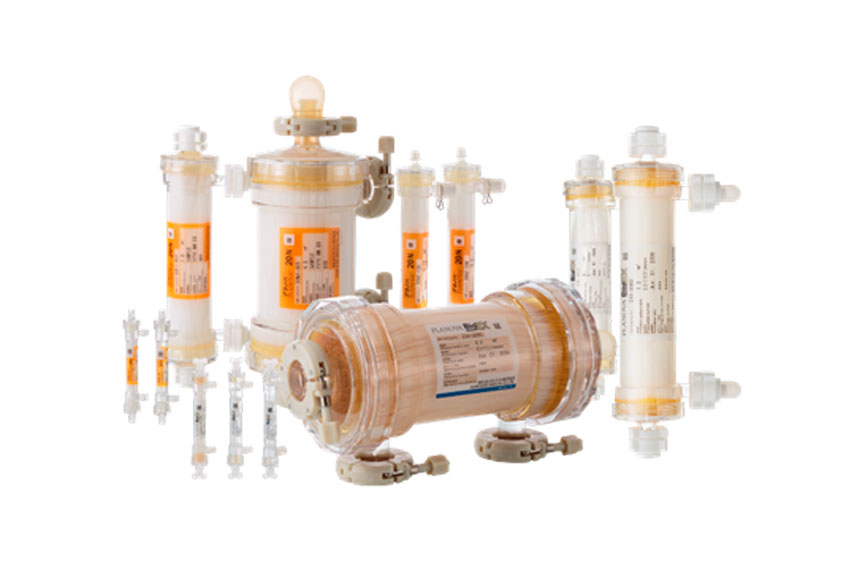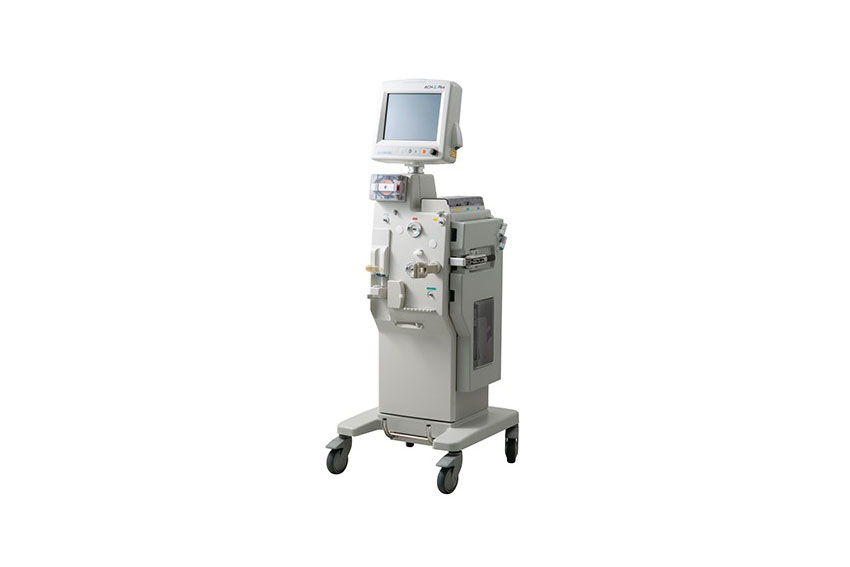Since introducing the world’s first dialyzer using hollow fiber membranes, Asahi Kasei Medical continues to support and protect Kidney disease patients around the globe.

What benefit has your experience working in overseas markets brought to your presidency at Asahi Kasei Medical?
It would be Asahi Kasei who can judge it. Asahi Kasei is one of the traditional Japanese conglomerates based on 3 business sectors, Material, Homes and Health care, and just celebrated their 100th anniversary as a company last May. The Group is quite internationalized, but I would say that we are still not a “global” company. My presence here is relatively a rare case as I came from a different foreign company, and I would like to believe that I could have brought something that was not really similar to Asahi Kasei's culture and tradition. Another point I have to note, is that I have not been involved in the Asahi Kasei’s healthcare business before I join here, and also by the environment given by Asahi Kasei Group, I did not too much care about the history of Asahi Kasei Medical, to make strategic decision.
In this report, we’re trying to challenge the misperception, which is usually not an innovation problem but a communication problem - for Japanese firms to communicate their strengths to the international market and likewise to understand the needs from overseas. What role can you play as a bridge between Asahi Kasei, both medical and the group and the overseas?
It is not an easy question to answer because my first business field, Bioprocess Division of Asahi Kasei Medical, was already very much internationalized since its 90% of sales was outside Japan at that time. They already established a sales office in the US and Europe, and they just opened a technical center in Germany. As smooth communication was already established in the division and with customers, it was easy for me to establish smooth communication internally, as well as with customers. I think my background with international experience helped me too.
There is a misperception about the Japanese medical sector as having great success domestically but being unsuccessful in translating that success overseas. However, there are numerous examples of Japanese firms with interesting unique technologies in quality-sensitive sectors. What do you see as the strengths and weaknesses of Japan's medical sector?
I think there are not a lot of companies that have achieved great success outside Japan. Some examples of globally successful companies in healthcare industry are Terumo, Nipro and Olympus as medical devices, Fujifilm for Pharma CDMO field as example. Much fewer pharmaceutical companies seem being successful globally, except Takeda. To that end, I cannot say that the Japanese healthcare industry, in general, has achieved great global success. Some successful companies are either very active on M&A and investments or very much focused on the field of strength. As my personal understanding, Fujifilm is an example of M&A with investment; Olympus is of focused business. Terumo expanded their international presence through their own products but also by M&A, and Nipro through very active investments. Perhaps, it is not a Japanese strength but rather a company characteristic.
Japan is the front-runner in having a very aged society and a declining population, which has more negative impacts, like social expense, than positive. One of its plus sides might be the healthcare business opportunity to support aged generation, using AI and digital technologies. As experiencing it as the first in the world, Japan could explore such experience to other countries like China, which is also facing the same issues.
Can you tell us more about your membrane filter technology that has allowed you to become a global leader in dialysis and blood transfusion-related treatments and equipment?
Asahi Kasei has several core technologies within the group, including fibers & textiles. It is not by chance, that all our four businesses of Asahi Kasei Medical were originated from textile fibers. The first dialyzer was the diversification of a fibers called Bemberg TM , using fiber spinning technologies. We are not the inventor of the dialyzer or artificial kidney, but as far as I know, we are the first inventor of the hollow fiber dialyzer in Japan. It goes back to the 1970s, almost 50 years ago. Since our invention, we have developed an excellent market share in Japan and have been expanded this business to China and greater Europe, offering high quality dialyzers to the CKD patients.
After that, we also developed leukocyte removal filter called SepacellTM, with using non-woven fabric technology. This business became a world leader of this field. Similarly, PlanovaTM , virus removal filter, was developed from BembergTM in the late 80s. It was in the late 90s when the society faced with contamination issues of hepatitis or HIV into blood plasma derived pharmaceutical products, PlanovaTM became industry standard for virus filtration.

SepacellTM
What role does PlanovaTM play for your business today?
Although PlanovaTM was invented more than 30 years ago, usage of this virus removal filter continues to grow in biologics field. For virus filtration, we remain as a leader in this industry. We believe that the necessity of virus filter would last for another decades. Having said that, no product can last forever. Bioprocess business has been expanding their business fields by M&A in the last 10 years, in addition to virus filters. In 2009, we acquired a company in the US, who provides process machines for biopharma. Then we entered into Biosafety Testing Services, by acquiring 2 companies in 2019 and 2021 in Austria and the US. The company in Vienna specializes in virus and prion safety testing, meanwhile, the one in the US specialized on mycoplasma safety testing. We combine this two expertise to expand this biosafety services business. The latest field we expanded is biologics CDMO (contract development and manufacturing organization for biopharmaceuticals). There are many bio-ventures and start-ups on the West Coast in the US. They usually concentrate on drug discovery and early development stage without focusing on production. We contract with them to produce the clinical testing drug with developing the production process. We are aiming to expand this business to new modalities like gene / cell therapy. All fields are inter-connected within Bioprocess. PlanovaTM could be the hub of it, having notoriety in the biopharma industry.

PlanovaTM
What is the next step in your plan of growing the bioprocess business? Can you tell us more about your motivation for your acquisition of Bionova Scientifics as well as the other firms you’ve mentioned?
As of now, I cannot comment if we are planning another type of acquisition similar to what we have done in last years. Anyhow, 5 years later since Asahi Kasei Medical changed its development strategy, we continue to seek growth through different options, M&A, licensing, using small equity investment for ventures and start-ups, and also in-house development using our own core technologies.
As for Business Development in sense of M&A and small equity investment, Asahi Kasei Medical established our own BD team hiring one person who has a long experience in this field based in Boston area of the United States. In collaboration with ZOLL Medical Corporation, who has rich experience of M&A, and CVC (Corporate Venture Capital) of Asahi Kasei Group, we continue to seek further growth, by combining our forces.
All four of the core businesses of the Asahi Kasei Group that stem from the history of textile business have evolved together, but to some quite divergently. Can you tell us more about the advantages of being part of this group structure and the synergies you are able to create?
As I mentioned earlier, Asahi Kasei has three business sectors - Material, Homes and Health Care. There are several stages of synergies. Within the healthcare sector, we have four operating companies, ZOLL Medical, Veloxis Pharmaceutical in the United States, Asahi Kasei Pharma and Asahi Kasei Medical. All of us have different type of businesses. We hold a quarterly healthcare management meeting with all the key representatives from the four companies and 2 leaders of healthcare field of the Group, to discuss our strategies, opportunities and actions. Richard Parker, one of co-leaders of healthcare field, could give us a lot of supports and suggestions, based on his considerable experience in the healthcare industry of US.
We also have synergies and advantages of Asahi Kasei group level. Asahi Kasei Medical is “still” not a multi-billion dollars company, but we are a part of Asahi Kasei Group. It is difficult to finance to make big M&A by our own, however, the group support it with their capability including finance point of view. Asahi Kasei Medical has their own finance/accounting, legal, IT, HR and all the functional teams, but our resources and experiences are sometimes not enough for some cases like large M&A. For this kind of big project, Group functional teams could support us in Japan, and other countries. On the technology side, we have a group horizontal core technology team where researchers from Asahi Kasei Medical join to, sharing their knowledges and experiences. Also, we can create synergies between different business within the Group. As an example, sensor technology of Asahi Kasei Microdevices would have great opportunities in healthcare filed.
What is the current focus of your R&D strategy?
As for in-house, we focus on membrane filtration and adsorption technology, particularly for new product development of apheresis and virus removal filters. We also conduct some projects in collaboration with academia like universities or hospitals, trying to develop new solutions for rare diseases, which would take ~10 years, like pharmaceutical development.
We have two folds strategy. For dialyzers, leukocyte removal filters or virus removal filters, we continue to develop new products answering to the market requirement, to make these business grow further. However, there might be a limit of growth and limit of offering new solutions to the patients / market, only with our own technologies and current products / services. We should be open to introduce new ideas, technologies, products/services from outside, through collaborations, licensing and acquisitions, to go beyond this limitation.
Are there any particular types of companies or technologies that you are currently seeking partners for?
We have just acquired CDMO in the bioprocessing field, so we are currently more focused on materializing the growth plan they have today instead of seeking new partners. However, we are always open to collaborate with other companies when it makes sense. There are still a lot of diseases in the world that do not have effective treatment or drugs. Therapeutic apheresis is a niche therapy but can sometimes be only the solutions to save the lives of patients or improve QOL. For instance, we have an apheresis machine called Plasauto Sigma, which is a multifunctional machine for blood purification, and is already treats four or five different therapies. Many examples are already installed in Japanese hospitals, if someone has ideas or technical solutions which could be offered to patients through our machines, we are very interested in working with them. We are currently working 2 possibilities for this kind of collaboration.

Plasauto Sigma
How are you materializing your plans?
It depends on the business. The bioprocess business is a global business, multinational pharmaceutical company can use the same product in the US, China, Europe and Japan. The medical device business is different. Local regulations or market requirements are basically different. It is quite local business in this sense.
Regarding Bioprocess, we have 2 points. As for newly joined CDMO business, we primarily concentrate in the US market, since there is no doubt that it offers the greatest opportunity for the growth. Then for virus removal filter business, our main markets are the US and EU. In addition, there has been tremendous growth opportunities in biologics in China in last 5~6 years. In 2020, we opened Asahi Kasei Bioprocess China, to follow this opportunity and supporting customers.
Is there a particular objective that you have set yourself for your presidency that you would like to achieve or add to the tapestry of this company?
Each business has a unique issues and challenges. As the business itself is run by the division leaders every day, so I do not need to interfere each time. They do their job, and I trust them. What I need to do is 1) making Asahi Kasei Medical’s vision and strategy, make it penetrate into the whole team, 2) making timely decision and prepare the necessary environment (including resources distribution) to make the vision happen and to allow the people work efficiently and being happy, 3) prepare for our 2030 or later.
Imagine we come back to interview you again in five years to interview you all over again; what would you like to tell us? What are your dreams for the company, and what goals would you like to have accomplished by then?
In five years, we would still be on our way to realizing our vision for 2030, which is to be one of the core companies of the Asahi Kasei healthcare with the highest growth and profit. We are serving our product and services to save lives / improving QOL either directly or indirectly. We save lives directly through our blood purification products. One out of three CKD patient in Japan uses our dialysis, 3 times a week. Dialysis cannot stop because the patient's life depends on it. We have supply responsibility because they cannot stop the treatment. In turn, PlanovaTM does not directly save a life as it is, because it is B2B processing filter. But pharmaceutical company would have great difficulty to produce their biopharma products without virus filter, thus cannot deliver their drugs for rare diseases to save lives or improve QOL of patients. People are waiting for their needed drugs every day,
Asahi Kasei Medical continue to supply our products, and seek new healthcare solutions for the industry and patients with fulfilling our mission;
“Pioneering Innovative and Reliable Healthcare Solutions for Better Quality of Life”
0 COMMENTS